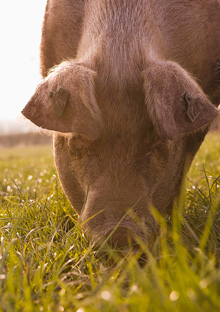The Tastiest Bacon You'll Ever Eat

Photo: © 2009 Jupiterimages Corporation
You won't find more blissful pigs than the heirloom breeds roaming around Jen Small and Mike Yezzi's 150-acre farm in upstate New York. You won't find better bacon, either. And yes, there's a connection.
As the morning mist evaporates from the Battenkill River Valley and sunlight saturates the cool, blue shadows, the hills are alive with the sound of...oinks. Today 60 lucky pigs at Flying Pigs Farm are going to a new pasture. "They're so happy," says Jen Small, 42, who owns the farm with her husband, Mike Yezzi, 41. "You can feel it." Their daughter, Jane, 5, is happy, too, because it's the first time she's been allowed to help with this chore. Her job? Herd 60 pigs, ten at a time, from the old pen into the new one. The "pens" are one- to four-acre sections of pasture and woodland, demarcated with portable fencing made of electrified wire. Pigs typically take a toll on the land they inhabit—trampling it bare, churning it into mud puddles, digging with their snouts for roots, minerals, and grubs. But here at Flying Pigs, a pretty 150-acre stretch of rolling fields and 19th-century farm buildings in Shushan, New York, the animals are relocated every three to eight weeks, depending on the season and their age. So, over time, their activities actually prove beneficial to the farm: They push back overgrowth from the encroaching woods, fertilize the ground with their manure, and till weeds into the soil. Meanwhile they have regular access to fresh grass and roots, and cool, clean mud wherever they go.
Jane carefully counts out ten pigs, sidling among them to separate this group from the rest, then gently shoos them down a six-foot-wide lane constructed of stakes and wire. As she walks behind them, she coos softly, "Come on, pigs; come on." And they do.
Jane weighs 45 pounds, the pigs five times as much. But she's not a bit nervous—and neither are her parents. In fact, so gentle and friendly are these pigs that, a few years back, a USDA inspector accused Jen and Mike of drugging them. "He said, 'They're too docile. I'm sending their livers out to be tested,'" recalls Jen. "Of course, there wasn't anything in those livers; not even antibiotics. It was an eye-opening day for that guy." He had never before encountered pigs raised with such kindness and care.
Jen and Mike wouldn't have it any other way. "We've always treated our pigs like pets," says Jen. "At first, it was naïveté: This is how you treat animals. Some of the older farmers in the area came by and sort of chuckled at us. I didn't care; I don't think it's anything to be ashamed of. It's the least we can do for the creatures that provide us with food."
Jen and Mike are part of a growing movement of farmers who are discovering that a humane, hands-on approach to raising farm animals isn't just wise, ethical, or environmentally sensitive (though it is all those things). It also results in a better product, one that conscientious consumers are willing to pay for. Beef and milk from grass-fed cattle and eggs from pastured chickens, for example, are higher in vitamins A and E and contain vastly superior ratios of omega fatty acids. Happier animals also mean more delicious meat; studies have shown that stress—from crowded, hostile conditions, overheating, lack of air—can decrease meat's juiciness. Feed also makes a difference: At Flying Pigs, the animals consume corn and soy, sheep's milk from a local cheesemaker, and apples from a local orchard, along with whatever they dig up from the dirt. And old-fashioned breeds are typically more flavorful. The heritage varieties at Flying Pigs—including Tamworths, Large Blacks, and Gloucestershire Old Spots—produce meat that is tender and infused with fat and a deep, savory porkiness.
"It's amazingly marbled," says chef Mike Anthony of New York City's Gramercy Tavern, one of about half a dozen top restaurants that order from Flying Pigs. "It has flavor and character. It's definitely not 'the other white meat.'"



